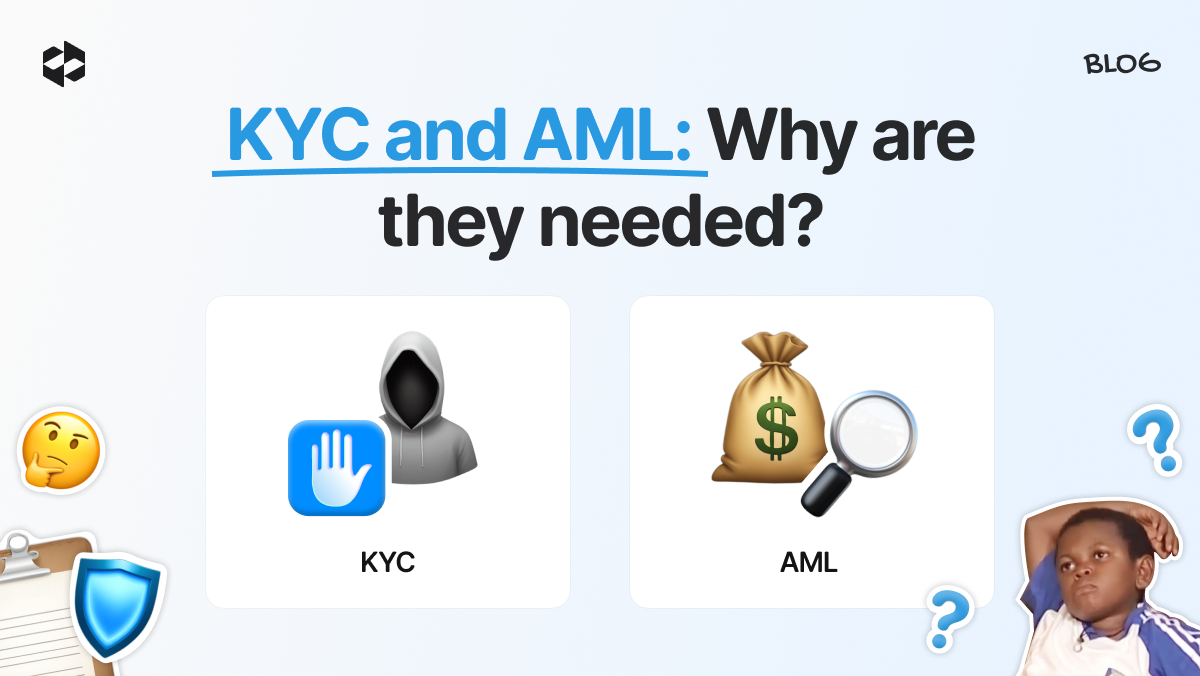
Anti-Money Laundering (AML) and Know Your Customer (KYC) protocols plat a crucial role in maintaining the integrity of any financial system, and cryptocurrency is not an exception. The decentralized and pseudonymous nature of cryptocurrencies presents unique challenges for regulators and financial institutions. Without proper AML and KYC measures, crypto platforms could become conduits for illicit activities, undermining the legitimacy and stability of the financial system.
Understanding AML and KYC in crypto
Anti-Money Laundering (AML) refers to a set of laws, regulations, and procedures designed to prevent criminals from disguising illegally obtained funds as legitimate income. In the context of cryptocurrencies, AML practices aim to deter and detect illicit activities, such as money laundering and terrorist financing, by monitoring and analyzing transactions.
Know Your Customer (KYC) is a subset of AML focused on verifying the identity of clients. For cryptocurrency exchanges and platforms, implementing KYC procedures involves collecting and confirming personal information from users, such as identification documents and proof of address. This process ensures that users are who they claim to be and helps prevent the misuse of digital assets for unlawful purposes.
The importance of AML and KYC in cryptocurrency
Implementing robust AML and KYC protocols helps to:
- Prevent financial crimes: By verifying user identities and monitoring transactions, platforms can detect and prevent money laundering, fraud, and other illicit activities.
- Enhance transparency: KYC procedures promote transparency within the crypto ecosystem and enhance trust among users, investors, and regulators.
- Ensure regulatory compliance: Adherence to AML and KYC regulations is mandatory in many jurisdictions. Non-compliance can result in severe penalties, including fines and operational restrictions.
Key components of KYC in cryptocurrency exchanges
KYC procedures are integral to cryptocurrency exchanges, ensuring that users are thoroughly vetted before engaging in transactions. The primary components of KYC include the following.
Identification: Collecting personal data such as the user's name, date of birth, and residential address. This foundational step establishes the individual's identity within the platform.
Document verification: Validating government-issued identification documents, like passports or driver's licenses, to confirm the authenticity of the user's identity.
Proof of address: Requiring documents such as utility bills or bank statements to verify the user's residential address, ensuring they reside at the claimed location.
Liveness check: Implementing biometric verification, such as facial recognition or video verification, to ascertain that the individual is physically present during the onboarding process.
Risk assessment: Evaluating the user's risk profile by analyzing their financial activities and the legitimacy of their funding sources, aiding in the detection of potential money laundering risks.
AML compliance strategies for crypto businesses
To effectively combat illicit activities, cryptocurrency exchanges and related businesses implement comprehensive AML strategies such as the following.
- Transaction monitoring: Deploying sophisticated systems to continuously monitor transactions, identifying patterns that may indicate money laundering or other fraudulent activities.
- Suspicious activity reporting: Mandating the reporting of any transactions that appear suspicious or exceed certain thresholds to relevant financial authorities, ensuring regulatory bodies are informed of potential illicit activities.
- Employee training: Educating staff on AML regulations and red flags associated with money laundering, ensuring that employees are equipped to identify and respond to potential threats effectively.
- Regular audits: Conducting periodic audits of AML and KYC processes to ensure compliance with evolving regulations and to identify areas for improvement within the organization's compliance framework.
Global Regulatory Landscape
Globally, regulatory bodies are tightening AML and KYC requirements for cryptocurrency platforms.
United States
The Financial Crimes Enforcement Network (FinCEN) mandates that crypto exchanges implement comprehensive AML and KYC measures. Failure to comply has led to significant penalties for several platforms.
European Union
The EU's Fifth Anti-Money Laundering Directive (5AMLD) extends AML and KYC obligations to cryptocurrency service providers, requiring them to register with financial authorities and conduct thorough customer due diligence.
Australia
The Australian Transaction Reports and Analysis Centre (AUSTRAC) has established a cryptocurrency task force to enforce AML laws, targeting non-compliant crypto ATM providers and digital currency exchange services. This initiative aims to curtail the misuse of cryptocurrencies for illicit activities.
China
Despite stringent restrictions on cryptocurrency trading, over-the-counter brokers continue to facilitate large transactions, often circumventing AML regulations. This ongoing cat-and-mouse dynamic highlights the challenges regulators face in enforcing compliance within decentralized systems.
International standards
The Financial Action Task Force (FATF) has issued guidelines classifying cryptocurrency exchanges as Virtual Asset Service Providers (VASPs) and recommends that they adhere to the same AML and KYC standards as traditional financial institutions.
Challenges and criticisms
While AML and KYC measures are essential for maintaining the integrity of the financial system, they are not without challenges. The most important among them are the following.
Privacy concerns
Some users argue that stringent KYC procedures infringe upon personal privacy and contradict the decentralized ethos of cryptocurrencies.
Operational costs
Implementing and maintaining comprehensive AML and KYC programs can be costly and complex for crypto businesses, and this may hinder their development.
Effectiveness
Despite these measures, criminals may still find ways to exploit the system, necessitating continuous adaptation and improvement of AML and KYC protocols.
Conclusion
AML and KYC protocols are indispensable in safeguarding the cryptocurrency ecosystem from illicit activities. By implementing robust compliance measures, crypto businesses not only adhere to regulatory requirements but also foster trust and transparency within the industry. As the regulatory landscape continues to evolve, staying informed about changes and proactively enhancing compliance frameworks will be crucial for the sustained growth and legitimacy of the cryptocurrency sector.
